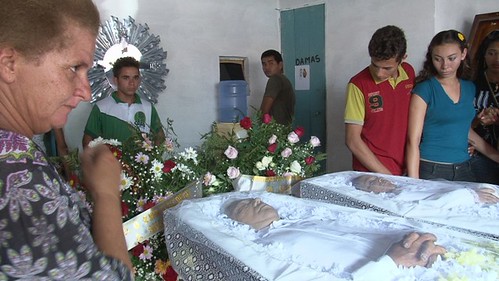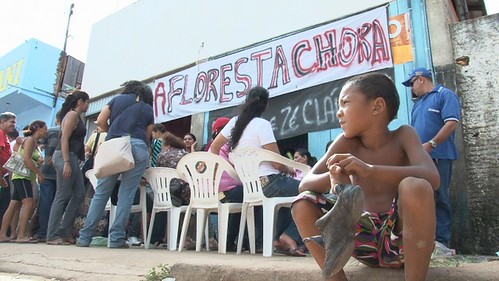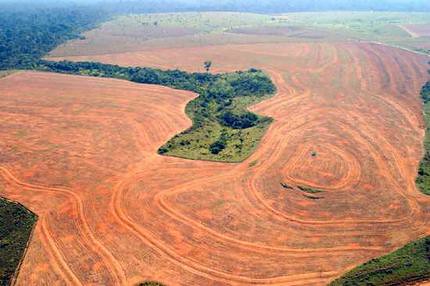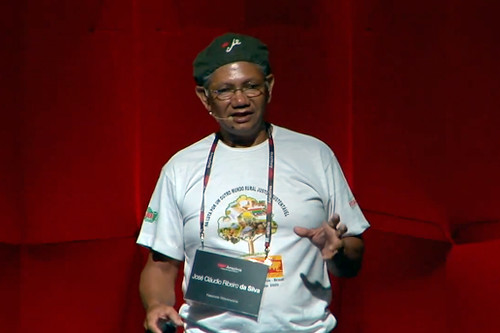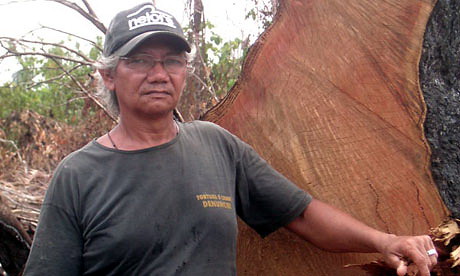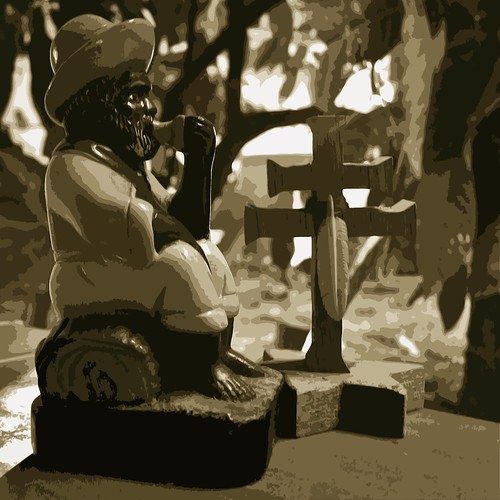BRAZIL FOREST CODE VOTE TODAY:
DILMA THREATENS TO VETO AMNESTY
FOR ILLEGAL LOGGING

[URGENT: Please join the new
avaaz sign-on letter. It is in Portuguese for Brazilian officials but you can easily enter you name, email and country. Please help the Brazilian forest defenders NOW.]
In early May, the Brazil Chamber of Deputies refused to vote on a new Forest Code presented at the last minute and debate had to be cancelled. (Photo and story
here.) President Dilma was warned by her Foreign Ministry that returning to the old pattern of deforestation would violate international agreements on climate change and biodiversity, and tarnish Brazil's new green image. Today, the agricultural bloc, or "ruralistas", will try again to force the issue and Dilma has threatened to veto any new code that offers aminesty from the fines leveled for past illegal logging.
Here is the latest report from AP.
SAO PAULO - 5/24/11 - AP — Brazilian legislators are pushing to resume debate Tuesday on changes to an environmental law that watchdog groups warn will speed destruction of the Amazon rain forest.
Supporters of the bill, which would loosen restrictions on the amount of forested areas that could be legally cut, are confident it will pass Brazil’s lower house, though a vote on the measure has been delayed three times before. If passed, the measure would go to the Senate.
The Brazilian Amazon is considered by many experts to be the world’s biggest natural defense against global warming, acting as a “sink,” or absorber, of carbon dioxide. At the same time, about 20 percent of the Brazilian rain forest already has been destroyed, and 75 percent of Brazil’s emissions are estimated to come from forest clearing as vegetation burns and felled trees rot.
The government blames deforestation on cattle ranchers and soy farmers who cut down trees to make way for more crop and grazing land.
Brazil’s “Forest Code” law now states that landowners in the Amazon, a vast area the size of western Europe, must maintain standing forest on 80 percent of their property. That percentage drops to 35 percent and even 20 percent in other regions like the Cerrado, a savanna that occupies a fourth of the country’s total area.
The bill introduced last year by Deputy Aldo Rebelo would exempt from these rules small farmers and ranchers who have no more than 990 acres (400 hectares) of land — and would give amnesty from fines to those who illegally felled trees up to July 2008.
It also would halve the strips along rivers that cannot be touched to 50 feet (15 meters) from the river’s edge from the current 100 feet (30 meters) and would allow farmers to use hilltops. Environmentalists say both changes would lead to flooding, silty rivers and erosion.
Environmental groups contend the full package of proposed changes would inflict severe damage on the rain forest.
“It will make the ‘savannization’ cycle, which in some regions has already begun, irreversible, and there will be less rainfall in the Amazon,” said Paulo Adario, coordinator of the environmental group Greenpeace’s Amazon campaign.
Others complain that giving those who have illegally cut down forest an amnesty would set a bad example, and Brazilian President Dilma Rousseff has said she would veto that.
“The proposed amnesty upholds a long tradition in Brazil of legalizing the illegal. People believe they can deforest illegally because sooner or later all will be forgiven,” said Philip Fearnside of the government’s National Institute for Amazon Research.
Brazil’s agricultural industry says the environmental law impedes the nation from meeting its economic potential, noting that Brazil is the world’s No. 2 producer of agricultural products while using just a third of its arable land. It says Brazil could easily surpass the U.S. if its farmers were not shackled from growing.
“We do not have to cut down one single tree. We can increase agricultural output in already deforested areas,” said Assuero Veronez, the confederation’s vice president.
Veronez and other defenders of the proposed changes point to the history of the Amazon’s occupation as a reason for the amnesty.
In the 1970s, Brazil’s military dictatorship pushed farmers to enter the Amazon, offering free land if they would clear trees, all in an effort to speed Brazil’s development.
Brazil’s government in the past decade, however, has stepped up enforcement of environmental laws, which officials credit with reducing destruction.
Satellite images from Brazil’s National Institute for Space Research indicated deforestation in the Amazon last year dropped to its slowest pace in 22 years.
Between August 2009 and July 2010, 2,490 square miles (6,450 square kilometers) of forest were lost, a 14 percent drop from the year before, and the least since 1988 when the agency began recording the destruction. It is down from a peak in 2004 when 10,723 square miles (27,772 square kilometers) were felled.
Last week, however, the government announced that 230 square miles (590 square kilometers) of deforestation were recorded in March and April, nearly six times more than in the same period last year.


